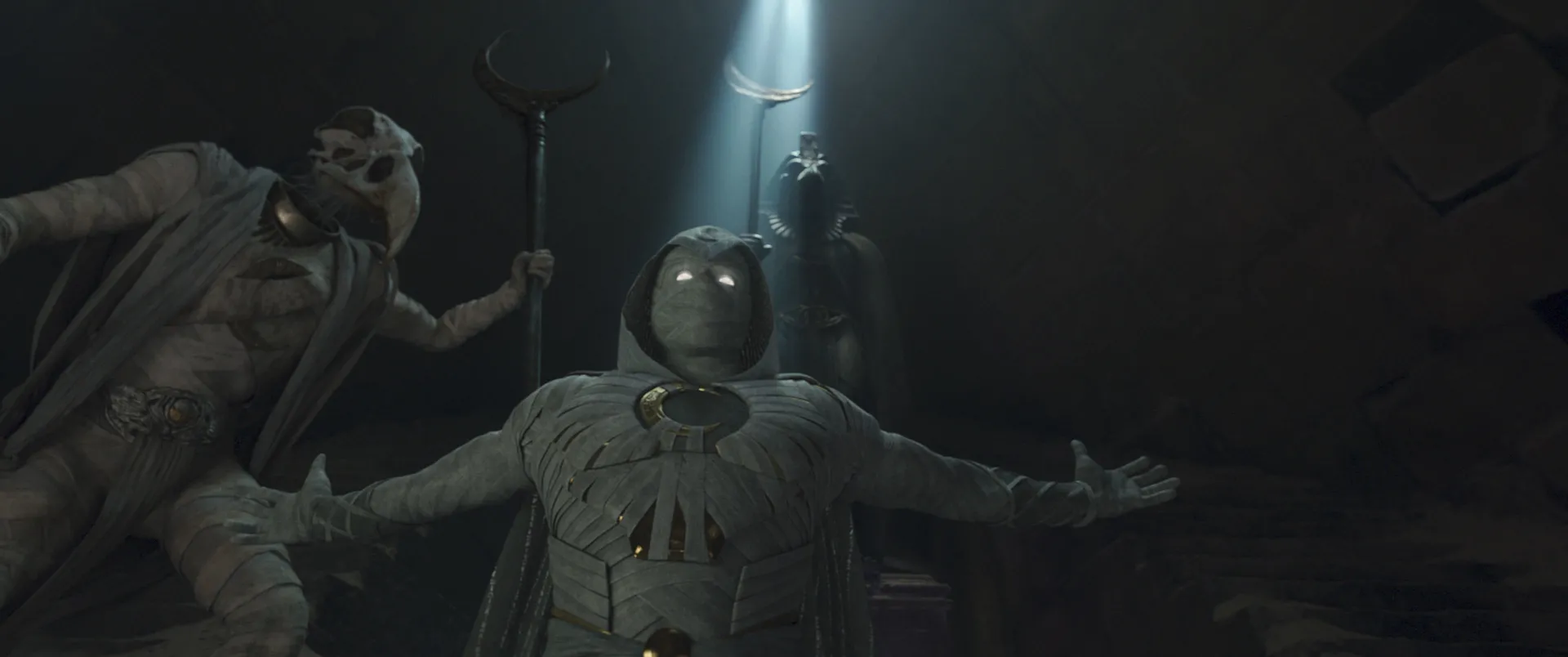This article contains spoilers for “Moon Knight.”
“Moon Knight,” the latest Marvel television series, arrived on Disney+ on Wednesday, March 30. Created by Jeremy Slater, the first season of the series brought the titular character from the Marvel comics to the screen, with new episodes airing weekly on Wednesdays. Leading up to the sixth and final episode of the first season season on Wednesday, March 4, “Moon Knight” stumbled in finding its footing as a darker, psychologically complex series, but the cast and crew have shown a commitment to telling a new type of Marvel story.

c/o Marvel Studios
The show is led by Oscar Isaac, who takes on the dual roles of Marc Spector and Steven Grant, two identities sharing the body of a man with dissociative identity disorder. The show opens from Steven’s perspective as a gift shop employee at the National Art Gallery in London who often suffers from blackouts. Though Steven tries to stay awake to avoid losing time and memory, he finds himself waking up in the Alps one night to guns firing at him.
This moment marks the beginning of the show’s revelation that Steven shares his body with Marc Spector, a mercenary who serves as the avatar for the Egyptian moon god Khonshu (performed on set by Karim El Hakim and voiced by F. Murray Abraham). Steven, up until the Alps, had been kept unaware of Marc’s existence. Once Steven finds out about Marc, the two begin to communicate with each other, with the show depicting this through mirrors where the other alter appears in the reflection.
Marc’s connection to Khonshu gives him the power to turn into Moon Knight, a superpowered entity in a mummy-bandage-wrapped suit with moon-shaped details, a dramatic hood, and a moon-shaped cape. In Episode 2, “Summon the Suit,” Steven gets his own version of the Moon Knight suit as Mr. Knight, complete with a white three-piece suit and intricate Khonshu-themed details.
The show’s antagonist is Arthur Harrow (Ethan Hawke), a cult leader who is devoted to serving the Egyptian goddess Ammit and wants to resurrect her so she can purge humanity of evil. Isaac and Hawke are joined by May Calamawy as archaeologist Layla El-Faouly, Marc’s wife. Layla does not know of Steven’s existence, and her strained relationship with Marc is a major part of the middle half of the season.
The most interesting facet of the show has been the relationship between Steven and Marc as distinct personalities within the same body. As Steven, Isaac is endearingly optimistic and naïve as he is brought into Marc’s world of Egyptian deities and powers. It’s difficult not to feel for Steven, who lives a lonely life with only a goldfish at home for company and the sole aspiration of becoming a tour guide at the museum.
As Marc, on the other hand, Isaac is decidedly colder, shifting into a character who has been hardened by a childhood of trauma and a life of violence. Although Isaac uses an English accent when speaking as Steven, the actor uses his natural American accent to play Marc, further differentiating the two personalities. His performances as Marc and Steven are by far the best part of “Moon Knight,” and the way that he depicts their struggle to find a balance in their relationship is thrilling to watch.
These clear differences between the two personalities speak to Isaac’s skills as an actor and puts them on full display as he switches between Marc and Steven, sometimes in the same shot. It is wonderful to see Isaac getting the chance to highlight his acting abilities in a Marvel show, where one might not typically expect to see demonstrations of highest quality acting. Isaac draws on different physicalities, speaking styles, and mannerisms to distinguish between the two personalities, and the resulting performances, particularly in scenes where the two are in the same shot, are genuinely enjoyable to watch.
Episode 5, “Asylum,” is the show’s strongest episode so far by a long stretch, with a heavy turn to the series’ use of ancient Egyptian mythology. Watching this episode was a refreshing taste of how good Marvel shows can be when the plot is clear and they draw from the emotional depth of their characters. At the end of episode 4, “The Tomb,” Harrow shoots Marc in Ammit’s tomb, and Marc wakes up in what appears to be a psychiatric hospital and finds Steven in a separate body.

c/o Marvel Studios
In the penultimate episode, Marc and Steven are told that the psychiatric hospital is actually a boat sailing through the Egyptian afterlife. Their hearts must balance on the Scales of Justice in order to enter the paradise of the Field of Reeds, but when they find that their hearts are imbalanced, the two must explore their memories to try and balance the scales.
As Steven begins to experience memories from Marc’s childhood, he learns that the younger Marc lost his brother in a drowning accident that his mother then blamed Marc for. The abuse that Marc endured from his mother from then on eventually led him to unknowingly create Steven as an alternate identity. The two share a touching moment of emotional reconciliation, but their scales remain unbalanced, and, after a dramatic fight on the boat, Steven is dragged down into the dunes below, turning to sand while Marc arrives in the Field of Reeds.
In comparison to Episode 3, “The Friendly Type,” and Episode 4, “The Tomb,” “Asylum” was a striking demonstration of how good “Moon Knight” could have been throughout the entirety of the first season. Isaac shines as the lead of the show as Marc and Steven come to terms with their childhood, and the ending of the episode leaves viewers emotionally stunned.
“Moon Knight” holds an interesting place among the other MCU series on Disney+ because it is not afraid to stray away from a dependency on the existing heroes from the Marvel Cinematic Universe to go down a new path. The darker tones of the show are clear from the opening scene of the first episode, where Harrow breaks a glass, places the broken shards in his shoes, and then steps into them. However, the series still contains moments of levity that feel typical of Marvel content, primarily through Steven.
The show is also strongly centered around Egyptian culture and history, which the crew behind the series has been intentionally driving at. Director and executive producer Mohamed Diab, who, being Egyptian himself, is the first Arab director for a Marvel Studios project, made a point of hiring Egyptian actors and bringing in Egyptian crew members to avoid “Orientalist” portrayals of Egyptians and tropes.
Another one of the show’s greatest strengths lies in its soundtrack, created by Egyptian composer Hesham Nazih. Nazih has spoken in interviews about his intention to develop a sound for the show that was both Egyptian and universal. The show’s theme, which plays over the credits at the end of every episode, certainly achieves this goal, and is as memorable and unique as the themes for “The Falcon and the Winter Soldier” and “Loki.”
The visual effects of the show are also stunning for the most part, from the incredible details of Moon Knight’s costume to Khonshu’s looming presence and bird-skull head. One incredible visual scene came in Episode 3, when Khonshu and Steven turned back the night sky to two thousand years ago, physically reversing the locations of the stars.
Ahead of the show’s finale, though, it is hard to see how “Moon Knight” will be able to wrap up every single one of the plot lines it has just begun to weave. Surely Khonshu will return; Marc may escape the Field of Reeds to try and rescue Steven. Some have wondered whether Jake Lockley, another one of Marc’s alters from the comics, will also appear in the show. On top of all of that, it’s difficult to see how the show will also manage to balance to bring any resolution to Harrow’s role in the show as a servant of Ammit, or if the goddess herself will appear in the finale.
This is the same problem that previous Marvel series on Disney+ have run into: The limited number of episodes constrains the storytelling abilities of the series. It is hard to understand why Marvel only made six episodes of “Moon Knight” given the immense scope of the show so far, and it is difficult to fully engage with any of the plot lines knowing only one episode remains.
Viewers can only hope that the finale of “Moon Knight” will not end up like the last episode of the first season of “Loki,” where story exposition seemed to take over the majority of the episode. Though “Loki” has been renewed for a second season, there has been no word yet from Disney+ or Marvel on whether or “Moon Knight” will be given the same treatment.
While “Moon Knight” has had its ups and downs in its first season, the team behind the show, and most of all, Isaac, have clearly dedicated themselves in their efforts to introduce a new character to the massive world of Marvel heroes. It will be a shame if the series does not get a second season and another chance to continue developing Marc and Steven’s story.
Jem Shin can be reached at jshin01@wesleyan.edu.
Comments are closed